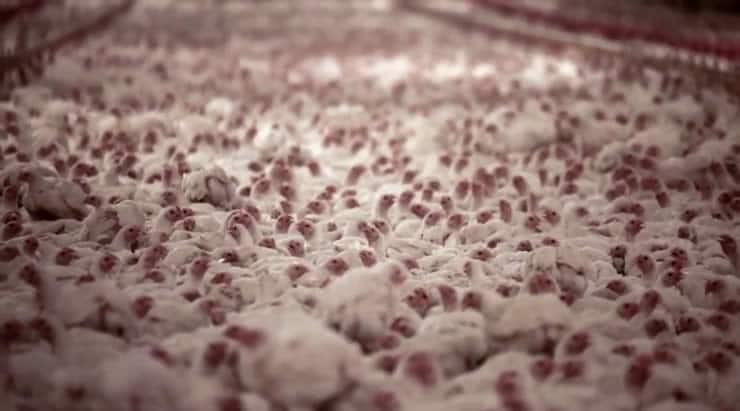Five Ways to Have a More Humane Holiday Meal
Dec 22, 2014, Updated Dec 10, 2016

Horrific. Appalling. Shocking. Abominable. Heinous. Cruel. Disgusting.
Reprehensible.
All of those words come to mind when I think of modern chicken production (it’s no longer reasonable to call it “farming”).
It’s bad for the animals, it’s bad for the planet, and it’s bad for us, too. “You are what you eat” comes to mind.
Our supermarkets, with their sterile, plastic-wrapped packages of pre-butchered meat do an effective job of shielding us from the reality of where our food comes from. Most people have no idea just how awful the living conditions are for most of the animals that are raised for meat.
The image above is from the following video, created by Compassion in World Farming. There are some graphic and heartbreaking images in here, but it’s important not to shy away from this. I encourage you to take a deep breath, watch, and then read on:
Now, I’m not about to tell you to stop eating meat. But I am going to ask you to take action to help ensure that the animals you are eating are not subjected to the cruelty like what is shown in that video.
I met up with Olivia from the ASPCA at a conference earlier this year, and I was thrilled to learn about their Truth About Chicken campaign. They’re working to educate people about where their meat comes from, and, better yet, empowering folks to help bring about change. Olivia recently sent me a list of some things you can do to help ensure that the lives of the chickens we eat will get better, and I’m happy to share them with you today.
So read on, take action… and then enter the giveaway below!
1. Get Certified
The seemingly well-meaning marketing terms on the front of packages may sound great, but they’re often unregulated and much more about marketing than actual animal welfare.
For example, “Cage Free” is a good start, but chickens and turkeys raised for meat (instead of eggs) are not typically caged, anyway — but they could still spend their entire lives in a crowded, filthy barn with no windows.
Instead, look for certifications that require better treatment of animals, specifically Certified Humane Raised & Handled, Animal Welfare Approved and Global Animal Partnership “Step 3” and above. Take the ASPCA’s helpful label guide with you so you’re armed with facts.
2. Don’t Pay the Cost of “Cheap” Meat
In short, you get what you pay for. Industrial meat often costs less because companies cut corners with welfare and cheap feed, and use antibiotics to speed up growth. Investing in higher-welfare products sends the message that animal suffering is unacceptable.
Happy animals are healthier animals, which means that what you’re putting into your body is better for you, too.
3. Go to the Source
Use Local Harvest to locate a farmers market near you. There you can often talk directly to people who work on or for the farms to learn how they raise their animals. Ask them about their use of cages, pasture, and antibiotics. Ask to see photos of their farm – they should be excited and proud to show you how they care for their animals.
When you buy a pastured, humanely raised chicken (or turkey, or pig…) from a farmer that really cares about the animals, you’re voting with your dollars and truly making the world a better place.
4. Plant Power
Meat may be the traditional centerpiece of a meal, but that doesn’t mean there needs to be a ton of it. Why not load up on amazing veggies, too?
5. Ask and Receive
You have the power to demand more humanely raised products in your stores. Talk to the butcher and ask where the meat comes from, and then follow through by buying only the meat that meets the higher standards of care.
At Whole Foods, for example, they clearly label the standards for their meat (using the Global Animal Partnership Step-Ratings). I’ll only buy “Step 4” rated meat or above, which means the animals live on pasture their entire lives.
This holiday season and going forward, demand more humanely raised chicken in your local stores with the ASPCA’s supermarket request letter.





















We belong to a CSA that has fall and winter programs, as well as options for dairy, meats, and poultry. That makes is so much easier to know that our food comes from responsible farmers.
I always have a humane meal because I am a vegetarian. Thanks!
I do this!
I’m bringing just plant based foods for Christmas!
THANK YOU!!!!!
focus on real food, locally grown and sourced where/when possible
Trying to have more plant based dishes At the holiday meals
Not eating meat.
I am trying to buy everything certified organic. I also try to purchase free range, grass fed meat whenever possible.
I buy all my meat local, so I know exactly how the animals lived their lives.